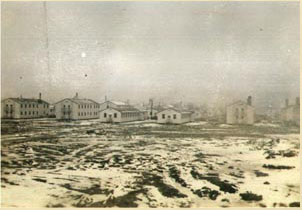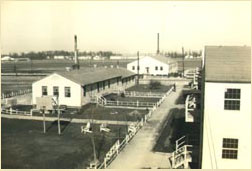- Things to do
-
Newton County Murals
Walking Tour of Murals Driving Tour of the Murals Diamond, Missouri Granby, Missouri Joplin, Missouri Neosho, MissouriA History of Newton County Tipton Ford Flower Box City Heritage Centennial The First Christian ChurchNewtonia, Missouri Seneca, Missouri
Mural CampUs Crowder CampUs Crowder 2 Monark Springs Rocketdyne Neosho Fish Hatchery Creatio Ex HominisThe Legend of Lost Creek An Indian Camp Frisco Depot # 3 4th of July...1917 Oklahoma Land Rush ofStella, Missouri
1879 -
Thomas Hart Benton
Festival - Calendar
- Communities & Map
- Newton County Videos
Camp Crowder History in Newton County
Camp Crowder was constructed in 1941-42 as a signal corps training center for the United States Army. The camp was named for General Enoch Crowder, a prominent military lawyer who was born on April 11, 1859, in Grundy County, Missouri.
 During World War II, the camp trained thousands of men to be clerks, radio operators, photographers and telegraphers. For a time, the camp was home to one of the more unusual branches of the signal corps - the pigeon corps which used carrier pigeons as messengers on the battlefields.
During World War II, the camp trained thousands of men to be clerks, radio operators, photographers and telegraphers. For a time, the camp was home to one of the more unusual branches of the signal corps - the pigeon corps which used carrier pigeons as messengers on the battlefields.
The average population of Camp Crowder during the war years was about 45,000. This included a contingent of WACs (Women's Army Corps). Although only about 1,000 women were stationed at Camp Crowder, it was the single largest group of WACs in the military.
The camp encompassed about 66,000 acres and had about 1600 buildings. Besides the usual barracks, mess halls and classrooms, Camp Crowder also had churches, a brig, hospital, theater, gymnasium, ball fields and a prisoner of war (POW) camp. The first prisoners to arrive at Camp Crowder came on October 6, 1943. These prisoners had been captured from Rommel's forces in North Africa .
 Camp Crowder was very much a typical World War II military camp. After some initial shunning of soldiers, civilians in the surrounding communities took an interest in the men and women at the camp. On many Sundays, soldiers were allowed to leave the camp to attend church and have Sunday dinner with families in the area. On the camp, the men formed athletic teams, had visits from celebrities who came as part of USO shows or just to stop off and greet the soldiers. Most of the men who were trained at Camp Crowder went overseas, serving in both the European and the Asian theaters of war.
Camp Crowder was very much a typical World War II military camp. After some initial shunning of soldiers, civilians in the surrounding communities took an interest in the men and women at the camp. On many Sundays, soldiers were allowed to leave the camp to attend church and have Sunday dinner with families in the area. On the camp, the men formed athletic teams, had visits from celebrities who came as part of USO shows or just to stop off and greet the soldiers. Most of the men who were trained at Camp Crowder went overseas, serving in both the European and the Asian theaters of war.
With the end of the war in 1945, activities at Camp Crowder began to wind down. For a short time, the camp was active as soldiers came there to be mustered out of the service. Despite efforts to keep the camp active, Camp Crowder was never the same as it had been in World War II. During the Korean Conflict, the camp saw a small bump in activity, but that was only a brief respite. Eventually the military moved out and the land was either returned to those farmers who had given up land for the camp or was turned over to other government entities.
Today, the camp has seen a remarkable rebound as a significant training site for members of the National Guard.
Camp Crowder was constructed in 1941-42 as a signal corps training center for the United States Army. The camp was named for General Enoch Crowder, a prominent military lawyer who was born on April 11, 1859, in Grundy County, Missouri.
 During World War II, the camp trained thousands of men to be clerks, radio operators, photographers and telegraphers. For a time, the camp was home to one of the more unusual branches of the signal corps - the pigeon corps which used carrier pigeons as messengers on the battlefields.
During World War II, the camp trained thousands of men to be clerks, radio operators, photographers and telegraphers. For a time, the camp was home to one of the more unusual branches of the signal corps - the pigeon corps which used carrier pigeons as messengers on the battlefields.
The average population of Camp Crowder during the war years was about 45,000. This included a contingent of WACs (Women's Army Corps). Although only about 1,000 women were stationed at Camp Crowder, it was the single largest group of WACs in the military.
The camp encompassed about 66,000 acres and had about 1600 buildings. Besides the usual barracks, mess halls and classrooms, Camp Crowder also had churches, a brig, hospital, theater, gymnasium, ball fields and a prisoner of war (POW) camp. The first prisoners to arrive at Camp Crowder came on October 6, 1943. These prisoners had been captured from Rommel's forces in North Africa .
 Camp Crowder was very much a typical World War II military camp. After some initial shunning of soldiers, civilians in the surrounding communities took an interest in the men and women at the camp. On many Sundays, soldiers were allowed to leave the camp to attend church and have Sunday dinner with families in the area. On the camp, the men formed athletic teams, had visits from celebrities who came as part of USO shows or just to stop off and greet the soldiers. Most of the men who were trained at Camp Crowder went overseas, serving in both the European and the Asian theaters of war.
Camp Crowder was very much a typical World War II military camp. After some initial shunning of soldiers, civilians in the surrounding communities took an interest in the men and women at the camp. On many Sundays, soldiers were allowed to leave the camp to attend church and have Sunday dinner with families in the area. On the camp, the men formed athletic teams, had visits from celebrities who came as part of USO shows or just to stop off and greet the soldiers. Most of the men who were trained at Camp Crowder went overseas, serving in both the European and the Asian theaters of war.
With the end of the war in 1945, activities at Camp Crowder began to wind down. For a short time, the camp was active as soldiers came there to be mustered out of the service. Despite efforts to keep the camp active, Camp Crowder was never the same as it had been in World War II. During the Korean Conflict, the camp saw a small bump in activity, but that was only a brief respite. Eventually the military moved out and the land was either returned to those farmers who had given up land for the camp or was turned over to other government entities.
Today, the camp has seen a remarkable rebound as a significant training site for members of the National Guard.